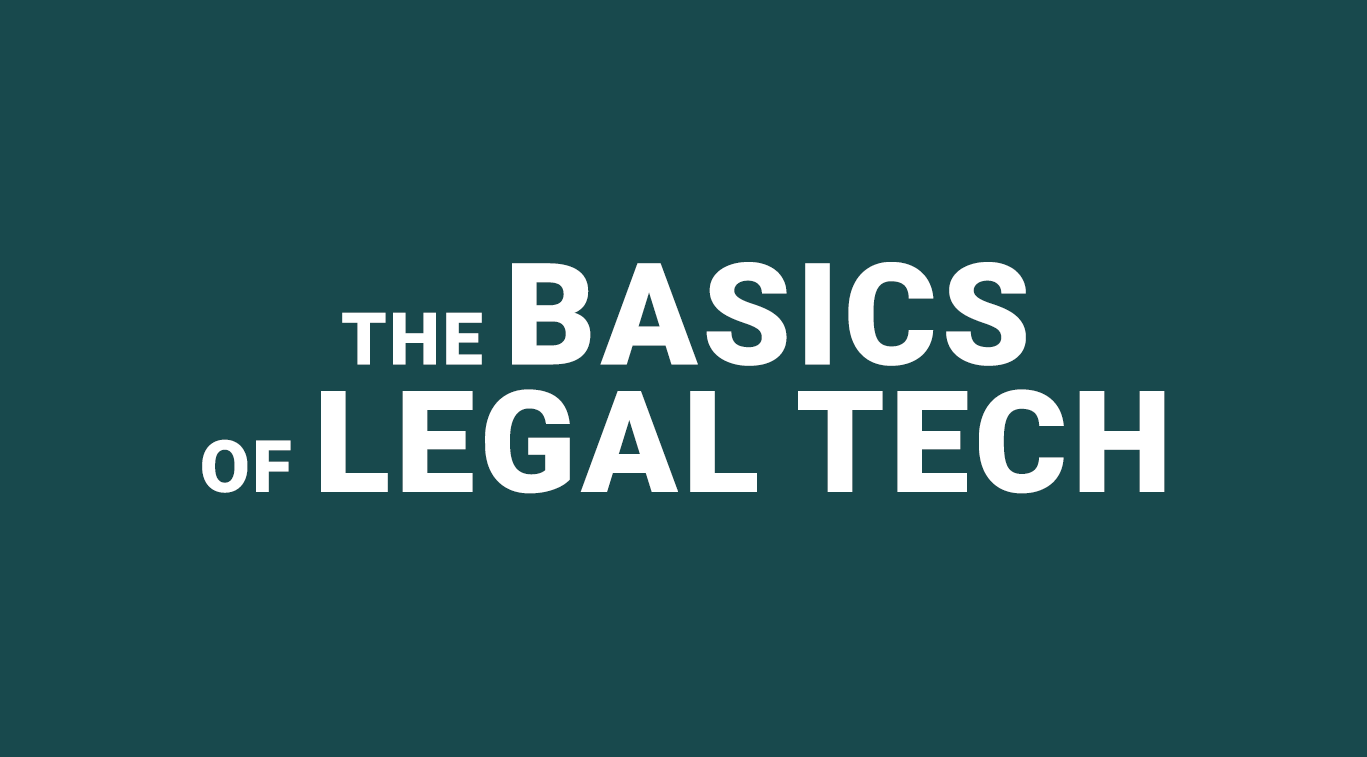The basics of Legal Tech

Written by Shrisha Sapkota
Blogger

Legal Technology or Legal Tech, is software and technology which is used by law firms or legal teams to facilitate their processes and improve their effectiveness[1]. Legal tech aims to simplify operations through law firm workflow solutions and improve the overall management of knowledge and information that exists in law firms or enterprises[2]. They can help individual lawyers, law firms, medium and large scale businesses with financials, office management, lead management, email integration and marketing, banking, reporting, organising calendars and documents.
Historically, lawyers have been resistant to embrace new technologies and innovation, but after the past recession in 2008, legal tech has been thriving with the promises to change the future of the legal industry. Though lawyers have long been described as risk- and, by extension, tech-averse, more firms are embracing tech solutions to streamline workflow and boost productivity[3]. Some have launched their innovation arms or are partnering with legal-tech companies to give themselves a competitive edge[4]. A field that has traditionally required people to rely heavily on expensive lawyers to navigate the complexity of the ever-changing legal system is now making it easier for regular people to get the advice and understanding they need, at a small percentage of the cost[5]. Law’s tipping point is its transition from lawyer-centricity to customer-focus which involves a series of shifts that include: lawyers-only to multidisciplinary and cross-functional collaboration; reactive to proactive; gut to data; homogeneous to diverse workforces; input to output; hierarchical to flat organisational structures, bespoke, labour intensive to automated, AI-assisted solutions; legal advice to business solutions; inward-facing law guild to customer-centric solutions collaborator[6].
It is believed that innovative firms tend to perform better, make more revenue, and maintain better client relations than their older-school counterparts[7]. According to a survey conducted in 2019, it was found that organisations that are already leveraging technology have an early adopter advantage in terms of profitability and readiness[8]. These organisations were said to be better suited to engage and participate in the emerging legal ecosystem. Nevertheless, harnessing the potential of technology will require a cultural shift by organisations, professionals and the legal industry as a whole[9].
Legal technology is changing how professionals in the legal sector are serving their clients not just for quality services but for offering an entirely new customer experience focused on easing the burden on both clients in-house and legal teams[10]. As law firms are being forced to be more flexible, efficient, and cheaper than in-house teams, they’ve been deploying business process, project management, and fiscal responsibility, new tools, new skills, data-driven, multi-disciplinary workforces, and a customer service mindset necessary in the digital era[11]. For example, workflow and process automation tools for administrative tasks optimises resource management due to which the tasks of a junior lawyer can be done through software technology. McKinsey estimates that twenty-three percent of work done by lawyers can be automated by existing technology[12].
According to the Insight Report of Deloitte from 2016, ‘profound reforms’ will take place in the legal sector, and almost forty per cent of legal professions will be automated in the longer term. It further predicts that by 2025, the jobs in the legal system will encounter overwhelming changes due to technological development and a new lawyer-client relationship, the need to offer more value for money[13].
Thomson Reuters has found that many traditional law firms are using advanced technology, or are outsourcing a wide range of work to legal process outsourcing providers (LPOs). Typical activities being outsourced include mergers & acquisition (M&A) due diligence, litigation support, document review, and administrative tasks[14]. While some companies in the market are stuck to traditional ways of doing business, others are turning into innovative law firms and attracting more customers by embracing the technology to optimise operations and improving the customer’s experience as well as building the trust of the existing ones, thus remaining competitive and staying on top of the market.
Cutting edge technology has the potential to transform the delivery of legal services and possibly free time for most legal professionals, allowing them sufficient time to focus on the actual matters and the service of clients including pro bono work which benefits those who cannot afford exorbitant hourly rates of legal fees[15]. The new delivery models that are aligned with the needs of consumers, not the maximisation of short-term lawyer profit. It is expected that technology will remove the cloak of mystery lawyers have long worn while delivering their services, thus enhancing transparency and alignment of the consumer with a provider, introducing predictive tools and compressing the lengthy resolution processes. It is believed that more than sixty percent of what lawyers do in their day-to-day activities could be automated by introducing automated solutions[16]. Even the best experts can misinterpret the facts, leading to misjudgment and further reputational and financial damage to the organisation, but the chance of human error can also be eliminated with automated technological solutions. It is a common complaint amongst in-house teams that their lawyers are overloaded and reducing this overload through the use of technology not only allows more focus on value-adding activities but also improves the lawyers’ work/life balance and reduces the frustration of repetitive tasks and questions[17]. Instead they revert to doing more judgemental, strategic legal work and potentially add new areas of specialism[18]. For example, an Intellectual Property lawyer might add skills in the legal aspects of cloud, blockchain or digital Business Models which help the wider organisation develop new products and services within a robust legal framework.
Technology provides visibility about the services provided to the organisation through dashboards and heat maps which demonstrate the value technology is adding and eliminates subjective evaluation[19]. This data offers the opportunity to identify and optimise areas where improvement is required. This quantifiable performance promotes the increased tailoring of legal solutions which are relevant to the organisation. Moreover, law firm management tools including document management system for collaboration and with real-time status reports and documents in one place, case management system for managing ongoing cases, enabling effective litigation management and litigation investing, cloud based legal accounting software for budgeting and reporting[20]. The insights derived from matter management systems may offer the opportunity to streamline the corporate structure.
Document management system includes statutes, precedents, court decisions, opinions obtained on behalf of the organisation, and regulations applicable to the business and entity management can provide a single source of truth containing information about each group member including shareholders, directors and filing deadlines[21].
Furthermore, applications of machine learning in the field of law can involve forecasting decisions, legal expert systems and argumentation or document modelling. Technology, process, data, and other essential legal delivery components transcend geographical boundaries and can be scaled around the globe. The commonality of delivery challenges such as contract management, knowledge management, data collection and mining, morphing services into products, automation, and other delivery elements far outweigh the differences between using legal tech or not. Thus, there is an enormous opportunity for consumers to benefit from a mature global legal marketplace where a myriad of local solutions is replaced by scaled, global ones. Legal departments own extensive data and using technology to structure data sets, improve their visibility and share it across the organisation can change the perception of legal from cost centre to business partner[22].
References
[1] https://www.lexology.com/library/detail.aspx?g=78c11ed9-0787-4b26-b062-3c6a1222d8e1
[2] https://www.lexology.com/library/detail.aspx?g=78c11ed9-0787-4b26-b062-3c6a1222d8e1
[3] https://www.businessinsider.com/legal-tech-disruption-biglaw-innovation-venture-capital-startups-2020-9
[4] ibid
[5] https://observer.com/2016/12/legal-tech-settle-your-case-online/
[6]https://www.forbes.com/sites/markcohen1/2021/06/22/laws-tipping-point-is-about-digital-transformation-customers-and-capital-not-firm-partners/
[7] https://www.businessinsider.com/legal-tech-disruption-biglaw-innovation-venture-capital-startups-2020-9
[8] https://www.linkedin.com/pulse/technology-has-potential-transform-delivery-legal-services-ndila/
[9] https://lawahead.ie.edu/demystifying-and-assessing-ai-for-legal-services-delivery/
[10]https://www.lexology.com/library/detail.aspx?g=8cd24d80-eb76-4a3c-8fc7-a82e7defb88a#:~:text=Legal%20technology%20is%20changing%20how,clients%20in%2Dhouse%20legal%20teams.
[11]https://www.forbes.com/sites/markcohen1/2019/10/07/big-money-is-betting-on-legal-industry-transformation/?sh=5acd57af5ce2
[12] https://www.cnbc.com/2020/02/06/technology-is-changing-the-legal-profession-and-law-schools.html
[14]https://www.thomsonreuters.com/en/press-releases/2017/august/thomson-reuters-analysis-reveals-484-percent-increase-in-new-legal-services-patents-globally.html
[15] https://www.linkedin.com/pulse/technology-has-potential-transform-delivery-legal-services-ndila/
[16] https://spd.group/tech-for-businesses/legal-tech-in-2021/
[17] https://www2.deloitte.com/global/en/pages/legal/articles/legal-technology-transformation.html
[18] https://www2.deloitte.com/global/en/pages/legal/articles/legal-technology-transformation.html
[19] https://www2.deloitte.com/global/en/pages/legal/articles/legal-technology-transformation.html
[20] https://www2.deloitte.com/global/en/pages/legal/articles/legal-technology-transformation.html
[21] https://www2.deloitte.com/global/en/pages/legal/articles/legal-technology-transformation.html
[22] https://www2.deloitte.com/global/en/pages/legal/articles/legal-technology-transformation.html








